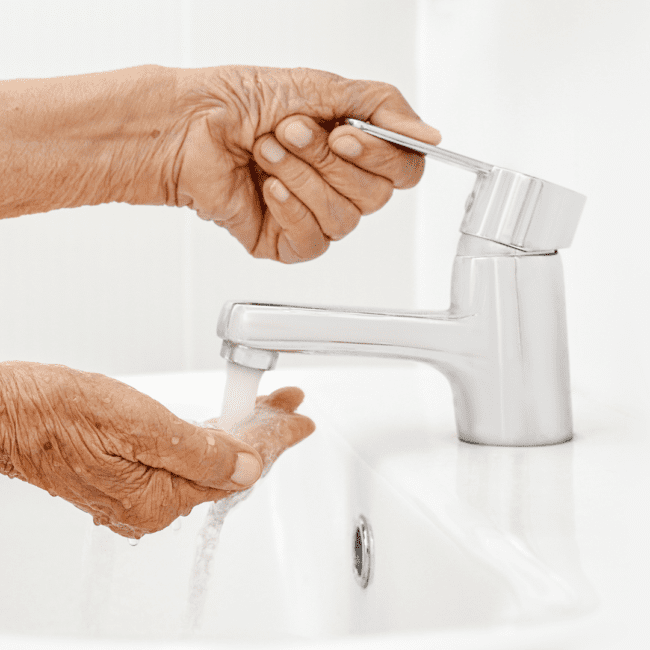In the heart of a bustling city, Mr. Gupta, 82, enjoys the golden years of his life from the comfort of his own home, surrounded by memories and the warmth of familiar surroundings. This scenario is becoming increasingly common as the global population ages, highlighting the growing importance of home health care.
But what is home health care, exactly? It’s not merely a convenience but a necessity for many, enabling seniors to maintain their independence and dignity while receiving the medical and personal support they need. Samarth Eldercare, with its commitment to compassionate and tailored home health care solutions, embodies the changing landscape of elder care.
This blog explores the essence of home health care and its critical role in supporting the aging population, underscoring why it matters more than ever in today’s society.
The Essence of Elderly Home Health Care
Elderly home health care is a comprehensive term that encompasses a range of services designed to support aging individuals in the comfort of their own homes. It bridges the gap between independent living and the need for medical care, offering a personalized approach to ensure seniors can enjoy their golden years with dignity and independence.
For those living outside of India with aging parents back home, understanding the nuances of home health care for the elderly becomes crucial. It’s not just about providing medical attention; it’s about enhancing the quality of life for your loved ones, ensuring they have the support they need to live safely and comfortably.
- Definition: Elderly home health care refers to professional support services that allow seniors to live safely in their homes. It includes both medical and non-medical assistance, catering to the unique needs of each individual.
- Promoting Independence: One of the core roles of home health care for the elderly is to promote independence among seniors. By providing the necessary care and support, it enables them to perform daily activities and maintain their lifestyle with minimal external intervention.
Services Offered in Elderly Home Health Care
- Medical Care: Including nursing, physical therapy, and medication management, tailored to those recovering from illness or managing chronic conditions.
- Personal Care: Assistance with daily living activities such as bathing, dressing, and eating.
- Companionship: Offering emotional support and companionship to reduce feelings of loneliness and isolation.
- Household Assistance: Help with housekeeping, meal preparation, and errands to ensure a safe and clean living environment.
Setting Up Home Health Care for the Elderly
When the time comes to set up home health care for elderly loved ones living in India, while you reside overseas, the process demands careful planning and consideration.
The journey begins with a thorough evaluation of your loved one’s needs, understanding that each individual’s requirements are unique and may range from basic assistance with daily activities to more complex medical care.
Worried about your Elderly parents back home?
Call us today to arrange Care Like Son and Daughter™.
- Evaluating Needs: The first step in how to set up home health care for elderly involves assessing the physical, emotional, and medical needs of your loved one. This might include determining the level of assistance needed for activities of daily living (ADLs), such as bathing, dressing, and eating, as well as any specialized medical care requirements.
- Choosing the Right Provider: Selecting a home health care provider is a critical decision. Look for providers with a strong reputation for quality care and the ability to offer a range of services tailored to meet the diverse needs of the elderly. Samarth Elder Care stands out in this regard, offering compassionate, comprehensive care designed to make seniors feel supported and valued in their own homes.
- Personalized Care Plans: Ensure the provider offers personalized care plans that are adaptable to the changing needs of your loved one.
- Qualified and Compassionate Caregivers: The quality of caregivers is paramount. They should not only be skilled and experienced but also compassionate and sensitive to the cultural and personal preferences of your loved one.
- Support Services: Beyond direct care, check if the provider offers additional support services, such as coordination with healthcare professionals, emergency response systems, and assistance with navigating healthcare systems.
Steps to Initiate Home Health Care
To ensure a smooth transition to home health care for your elderly loved one, consider the following steps:
- Consulting with Healthcare Professionals: Engage with your loved one’s doctors or healthcare team to understand the specific health care needs and recommendations. This will help in creating a care plan that addresses all medical and daily living requirements.
- Understanding Insurance and Financial Aspects: Investigate the insurance coverage and financial options available for home health care in India. This may include exploring private insurance, government schemes, or out-of-pocket expenses to ensure the chosen care plan is financially sustainable.
- Preparing the Home Environment: Make necessary modifications to the home to ensure it’s safe and comfortable for your loved one. This could involve installing safety rails, ramps for wheelchair access, and making the bathroom more accessible to prevent falls and facilitate easier mobility.
Navigating the Challenges of Home Health Care for Elderly
Elderly home health care presents a unique set of challenges as families strive to balance the independence of their loved ones with the necessity of ensuring their safety and well-being.
Understanding these challenges and identifying effective solutions is crucial for those living outside of India but who have aging parents in the country. Here’s a look at common issues and strategies to address them:
| Challenges | Solutions |
| Maintaining Independence | Empower seniors by involving them in decision-making processes related to their care. Use adaptive devices and technology to facilitate daily activities, ensuring they can safely perform tasks with minimal assistance. |
| Safety Concerns | Conduct a home safety assessment to identify and mitigate potential hazards. Install grab bars, anti-slip mats, and ensure adequate lighting. Regularly review and adjust the care plan to address changing health needs. |
| Healthcare Coordination | Utilize a centralized healthcare management system to keep track of medical appointments, treatments, and medications. Engage services like Samarth Elder Care that offer coordination with healthcare professionals. |
| Emotional and Social Well-being | Address loneliness and isolation by providing companionship through caregivers or community programs. Encourage engagement in social activities and hobbies that stimulate mental health. |
| Financial Management | Explore insurance options, government schemes, and other financial assistance programs available for home health care for elderly in India. Consider the costs of modifications and ongoing care in the financial planning. |
| Adapting to Technology | Offer training and support for seniors to use telehealth services, medical alert systems, and other health-related technologies. Choose user-friendly devices designed with the elderly in mind. |
Overcoming Emotional and Physical Hurdles
- Dealing with Resistance to Care: Resistance to care is a common emotional hurdle in elderly home health care. Overcoming this involves open communication, patience, and ensuring the senior feels respected and heard. Introducing care gradually and allowing the elderly to participate in choosing their caregiver can ease the transition.
- Ensuring Emotional Well-being Alongside Physical Health: Emotional well-being is as crucial as physical health in home health care for elderly. Regularly assess the emotional state of your loved one through conversations, observations, and feedback from caregivers. Incorporate activities that promote mental health, such as engaging in hobbies, social interactions, and exercises like yoga or meditation that cater to both physical and emotional health.
By focusing on these aspects, families and caregivers can work together to overcome the emotional and physical hurdles associated with home health care, ensuring a holistic approach to the well-being of the elderly.
How to Get the Best Out of Elderly Home Health Care Services
Maximizing the benefits of elderly home health care services requires a proactive approach, focusing on quality, consistency, and a strong partnership between the family, the elderly, and their caregivers.
For those living outside of India with aging parents back home, understanding how to get home health care for elderly loved ones and ensuring it meets their needs is paramount.
Maximizing the Benefits of Home Health Care for Elderly
- Personalized Care Plans: Create tailored care plans addressing the unique medical and daily needs of your loved one, ensuring comprehensive support.
- Qualified Caregivers: Select caregivers with the necessary skills, experience, and personality that align with your loved one’s preferences, emphasizing the importance of compatibility in elderly home health care.
- Active Engagement: Motivate your elderly family member to participate actively in their care, expressing their needs and preferences, which enhances their sense of autonomy and satisfaction.
Building a Supportive and Trusting Relationship with Caregivers
- Open Communication: Maintain transparent communication between the family, the patient, and caregivers, ensuring everyone is informed about care plans and any health changes.
- Respect and Empathy: Foster a caring environment through mutual respect and empathy, crucial for a positive home health care for elderly experience.
- Consistency in Caregivers: Aim for caregiver consistency to develop a trusting and familiar relationship, significantly benefiting the care quality and comfort of the elderly.
Ensuring Quality and Consistency in Care
Regular Assessments and Adjustments in Care Plans: Continuous monitoring and evaluation of care plans ensure they remain aligned with the evolving needs of your loved one. Elderly home health care services should be flexible, adapting to changes in health status, preferences, and medical advice.
Communication Strategies Between Families, Patients, and Caregivers:
- Regular Meetings: Schedule regular meetings (in-person or virtual) to discuss progress, concerns, and any adjustments needed in the care plan.
- Feedback Loops: Create mechanisms for feedback from the elderly and the caregiver to inform continuous improvement in care quality.
- Technology Utilization: Leverage technology for better communication, such as using apps or platforms that allow for the sharing of information and updates in real-time.
In conclusion, navigating elderly home health care effectively requires a blend of personalized care, skilled caregivers, and open communication to ensure the well-being and satisfaction of our aging loved ones.
By prioritizing these elements, families can create a nurturing environment that supports the independence and dignity of the elderly, even from afar. With the right approach and resources like Samarth Elder Care, it’s possible to maximize the benefits of home health care for the elderly, ensuring they receive the compassionate and comprehensive care they deserve.
Read more about How to Keep Seniors Active
How Samarth Can Help?
Samarth Elder Care stands as a pivotal ally in providing dignified and joyful living for the elderly. With its comprehensive elderly home health care services tailored for families in India and abroad, Samarth ensures personalized, professional care for every senior. From customized care plans to quality at-home services, Samarth is dedicated to improving elder well-being. Choose Samarth and ensure your loved ones receive the compassionate care they need.







